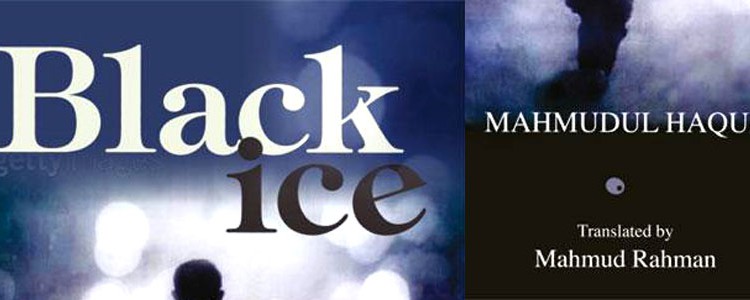Tales of Partition, my review of Mahmudul Haque’s “Black Ice”
July 19, 2012 By Jaya Bhattacharji Rose
Black Ice
By Mahmudul Haque
Translated by Mahmud Rahman
Harper Perennial
pp.123, Rs 199
Black Ice by Mahmudul Haque is about Abdul Khaleeq, a college lecturer in a village in newly independent Bangladesh. One day, he decides to start writing about his childhood and the memory floodgates open with such a force, leaving him withdrawn, confused and morose. His wife, Rekha, observes that he sleeps curled, with his knees drawn up and his arms folded tightly around him.
Initially, his account is peaceful and placid, with happy memories of childhood, discovering the world, under the protection of his family. As he attempts to recollect incidents from the past, the anecdotes become broken and he begins to find solace in his conversations with the local physician (a Hindu) and a friend, Dr Narbari. At first, it seems that the gentle documentation of daily life in the village is perfect. In the rainy season, “the rough-and-tumble villages take on a look of wild grace and tenderness”. But scratch the surface and there is discontentment and unease everywhere, compounded by the growing communal tension. Dr Narbari mentions casually that while buying fish in the market, he was taunted as a “malaun”, a derogatory term for Hindus.
There is confusion amongst the Muslims as well, what is their homeland — Pakistan or this new country Bangladesh? The veneer of tranquillity that the hustle-bustle of daily life in the village is as treacherous as black ice — “a rapid shift was taking place all around us. We didn’t understand any of it.”
The theme of war, consequently the notion of displacement and questions about national identity dominate Bangladeshi literature. As the translator of Kalo Borof, Mahmud Rahman says in a recent lecture he delivered: “We are migrant people”. So it is not at all surprising to have most forms of literature reflecting upon the journey back to 1971, year of independence/partition from Pakistan.
According to him Mahmudul Haque’s novels are “penned looking at the period from the eyes of the characters but remaining aloof from the story”. A very tough requirement, especially when the author has witnessed the two partitions of the country in 1947 and 1971. In fact, as a 10-year-old boy, who migrated to East Pakistan (Dhaka) from West Bengal (Barasat, Calcutta), he was lost and bewildered and actually tried to reverse the journey — Train to Narayanganj, steamer to Goalondo, train to Barasat.
Finally to settle in Dhaka, where he became a writer and is known primarily for his short fiction. He mastered the art of the local dialects and infused them into his literature (much of which is unfortunately lost in Black Ice), but the powerful story remains, with the trauma of the war upon the people conveyed acutely even when read in English. Mahmudul Haque is a storyteller who is known for his brevity, and his short fiction Black Ice is a good example of it.

